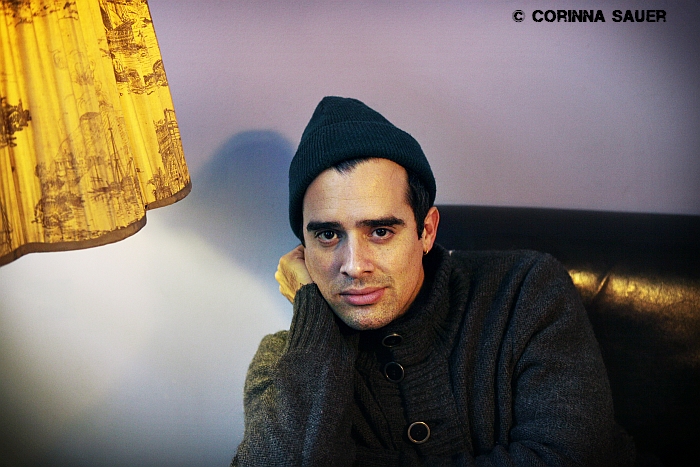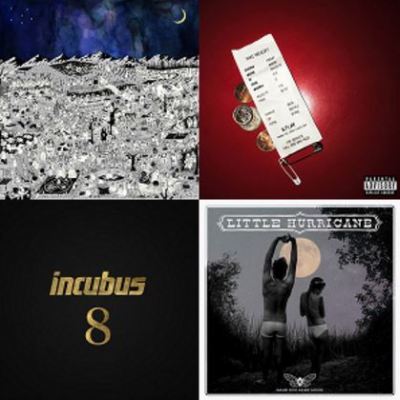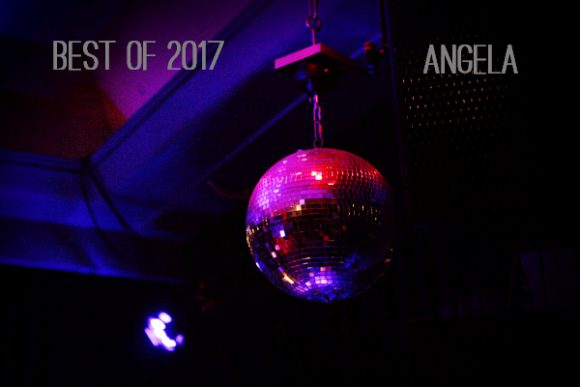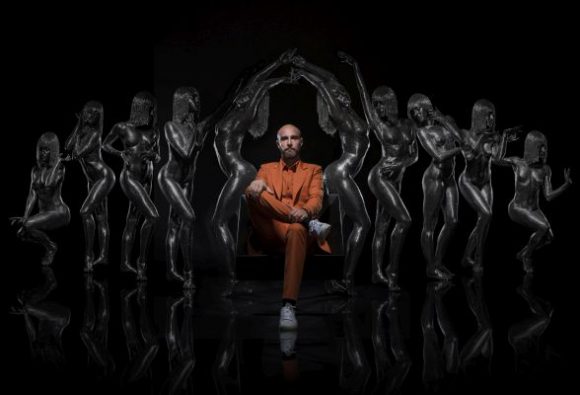One by one they came out like ghosts.
Interview und Fotos: Corinna Sauer
Interview und Konzert am 26. Februar 2015 im Privatclub
Ich hatte mal wieder das Glück, einen besonderen Künstler vor dem Konzertbesuch treffen und interviewen zu dürfen. Gabriel Rios ist Musiker. Außerdem ist er Maler, Skulpturist und Author. Er hat seine Wurzeln in Puerto Rico und fühlt sich in Belgien zu Hause. Seine musikalischen Einflüsse bestehen aus einer bandbreite an Stilen, die sich kaum auf einen gemeinsamen Nenner bringen lassen. Und vor Allem ist Gabriel ein wirklich netter und vielseitig talentierter Mensch, der mir von seinem musikalischen Werdegang, seinen Reisen und davon berichtete, was zu Hause für ihn bedeutet.
***
Sie sehen gerade einen Platzhalterinhalt von Youtube. Um auf den eigentlichen Inhalt zuzugreifen, klicken Sie auf die Schaltfläche unten. Bitte beachten Sie, dass dabei Daten an Drittanbieter weitergegeben werden.
***
Im Anschluss besuchte ich dann sein Konzert im Berliner Privatclub und erlebte dort erneut seinen Facettenreichtum, seine Liebe zur Musik und seine unverholene Tiefsinnigkeit, dieses Mal getragen durch seine Songs. Eine Gitarre, ein Cello, ein Kontrabass und drei Musiker_innen, die wunderbar präsent waren und die ihre Musik offenherzig mit dem Publikum teilten. Es war eines der intimsten Konzerte, die ich jemals besucht habe. Die Menschen saßen am Bühnenrand, einander und den Musiker_innen auf der Bühne zugewandt und zusammenfassend kann man sagen, „love was in the air“! Meine Hippie- und musikverliebte Seele erfreute sich an diesem schönen Konzerterlebnis, an das ich, sowie an das hier zu lesende Gespräch mit Gabriel, gerne zurück denke.
Hey! First of all, welcome to Berlin. How are you today?
Good! Thanks. We arrived today.
Do you know the city a bit?
No, actually not so well. I’ve been here only twice. I haven’t really spent enough time here to get to know it. I like it, I just don’t know enough about it to really enjoy it as much as I would like to. I’m afraid that’s gonna be that way with many cities, cause you never have a lot of time.
You’ve been moving a lot throughout your life. From Puerto Rico, where you were born, to Belgium and you’ve also been living in New York City for some time. Do you think your musical process has been influenced by you being a bit of a vagabond?
A lot. Coming to Belgium was the first big move. I was 17 and I wanted to study art. Another reason, why I wanted to move there, was that I had been attracted to Belgian music. I had heard, that they were playing certain interesting bands on daytime radio and where I come from, it’s much more conservative musicwise- especially regarding the radio, there is not a lot of alternative stuff going on. And that was before the internet boom and before people could find music everywhere. I’m that old (laughing). I’m 36, so that means, when I was 17, it wasn’t like you could find everything on the internet. The punk rock scene was the only scene with different variations in music… on cassette (laughing). So Belgium, to me, was an eccentric place in terms of music and it seemed very free. Like you could get away with a lot and be played on the radio. My idea of it was that. So I enrolled in art school and I went there, still in the back of my mind I was knowing, that I was gonna make music and that I wanted to try to get on the radio. It was sort of like an attraction to being different. I just wanted to go there and go crazy. And it really gave me a lot of freedom to do whatever I wanted. It’s right in the center and everything passes through there. There is a kind of weirdness or there was in the 90s and the music was very out there and very creative.
And funny enough, just recently going to New York to live, was kind of the opposite. I had lived in Belgium for 15 years. I was lucky enough to make a couple of records there. But then there was this problem all of a sudden, that I had been disconnected to a place, where English was spoken. So that whole freedom from before was now slightly becoming sort of an issue in a way. Now I had to connect to an audience that spoke my language. New York was more about standing in front of an audience that is used to seeing a lot of music and that is very demanding, even not knowing that they are, but they are. Because they are used to the singer-/songwriter tradition. So if you step up there with your guitar, it’s automatically a challenge. There is a lot of attention to what’s coming out of your mouth which is really unnerving. But I did it on purpose and I think it really ended up changing the music again. So that’s kind of what you hear on this record, that change. So every step in moving like this really changes your music.

Do you have something like a personal concept of „home“? And do you feel like you being creative, helps you find connections to places?
Yeah, I think it’s my only real connection to places. If I wouldn’t have had that in New York, I would have just been a little lost. So, the fact that we were playing every two or three weeks gave me sort of like an anchor. You know, I lived in the Lower East Side, in Chinatown and we used to play in this place called Rockwood Music Hall, which is not really a hall at all. It’s much smaller than this one (Privatclub). It’s a place, where people would go to find singer-/songwriters or good music in general- it has this reputation. I would just walk there with my guitar. I stayed always in this neighborhood and it kinda gave me an anchor. Otherwise you are just a tourist in the city. The rest of the time, I was just writing. In that way, my music gave me something to do and some purpose. But in terms of New York being a home- it never was. I was conscious of the fact, why I was there and that was to write songs and make music. I have to say, my home is much more Belgium. I would love to say, that it’s Puerto Rico, but it’s not. I mean, us Puerto Ricans, we are very nationalistic, but I got rid of that by leaving and I never turned back. So it’s kind of gone, this whole home country kind of thing. I just got awarded yesterday from the city of Gent. They gave me a price for being a musician from that city and I’m not even from there. So it was strange to receive a price above other people, who are actually from Gent. But still it makes sense to me, since it does feel like my home.
You said, that you’ve been studying art before, so your creativity finds various outcomes. In what way, do you think is expressing yourself through music different or special?
Music puts you in front of an audience immediately. Although, when you make a song you are alone, but you are thinking about how people are going to hear it. Not like how they will judge it. But when I make a song, I make it in a way pretending that I’m in front of people. I have a microphone at home and an amp and I just plug in and start. The first ears to hear a song are my own and I consider myself part of the audience in a strange kind of way. I try to find things that I would wanna hear. Music is much closer to the act of performing and sharing and connecting with people. My songs became themselves in front of an audience. Music is much closer to the act of performing and sharing and connecting with people. Visual art has that too, but there is a larger buffer and you are more alone with what you are doing most of the time. When it comes to music, I wanna start playing a song, as soon as it’s done, so that I can receive from the people and even take that energy and put it back into the song, to see if I can change it, depending on what happens with the audience. Still, in terms of creating, it doesn’t really matter to me what I’m doing. For this record I wrote a short story with a friend of mine and we put it in the special edition, which bears the same title as the record. I could be drawing or making songs… I just have to be making something. It’s like a compulsion or a way to escape a certain kind of emptiness that I don’t wanna face or to channel too much energy, so it doesn’t go somewhere else. You know, it’s a good place to put it.
I think, in a way, it’s a great asset for creative people, to have this… let’s call it a gate, to release and also to receive.
I think, it’s up to us to find something. And it’s becoming more and more what I do with myself. And it’s very rewarding, because it connects me to other people. I think I’m not incredibly social and also not very disciplined, so this makes me be disciplined and it also brings me in contact with people in a way, that I actually do have a purpose, when I sing for them.
Your music and especially your new album „The Marauder’s Midnight“ has this warm and organic feel to it. Your voice obviously plays a big role in that, but also the instruments that you choose. In which way did you work together with Ruben Samama, who has been arranging and mixing your songs?
Ruben is the bass player and his wife is the cellist. I met them in New York. They both come from a classical background and they’ve been studying at the Manhattan School of Music. It was very special to meet them, because they really effected the record. I started to become more and more attracted to instruments that are not in most of the pop-vocabulary, like cello or contrabass, and I became interested in using more classical arrangements. When I met Ruben, I saw how good he was at different things. He is classically trained, he also makes pop songs himself, he is a jazz bass player, he produces and makes music for commercials. He is very good with sound. So I remember thinking very early when I met him, that this was great, because certain things will be taken care of and that I could relay responsibility to him. Things that I don’t wanna deal with, especially, because they take a lot of energy and time. Arrangement-, sound-production,… We were on the same page anyway- I mean we would virtually do the same thing, if the choice was on the table. Many times we would know, what the other one would do without talking. It’s rare to meet somebody like that it’s really like a relief. And then his wife is an amazing cellist. We needed an instrument to suggest classical arrangements, without arranging for strings, which have the tendency to automatically give a soundtrack feel to the record and that’s not what we wanted. There is a loneliness in one cello that makes people shut up. In a concert, in a bar,… When I sing alone with a guitar, a song could be hitting the right place and people might be quiet. But when they hear the cello… It’s amazing. I’ve seen it many times. It’s very lonely, but it gives the hint of orchestration somehow, of a larger work that isn’t actually there. It’s almost like a ghost of something that is bigger. And I like that emptiness. It became the reason for the three of us to work together. It’s almost like listening to a very normal pop-song that usually comes with drums and everything. But none of that is in it. It’s only a cello, a guitar and a bass and it’s almost like somebody hearing you, trying to get somewhere and not actually getting there, but getting somewhere else. To me, the emptiness, the lack of instruments, is very inviting. And that goes for each of these songs. They all had to pass the test of being a good enough song for myself, then I brought it to the other two and if they didn’t like it, they weren’t gonna play it. And then there is the audience. So there were all these layers of passing different tests that made us end up with this sound.
In general, which significance does collaborating with other musicians have to you and in addition to this: Is there someone in particular you would like to work with in the future?
Kendrick Lamar. Kendrick Lamar, baby! He’s been the inspiration source for the day.
I never really think about collaborating with people. Never at all. Because I’m afraid of those kind of expectations. I still love it when it happens, but I much rather say nothing and have it happen and be surprised. So I’m basically open to whatever life brings. There’s people whose music I enjoy, but I’m not necessarily rushing to collaborate with anybody per se, until it just slaps me in the face and it just happens.
I’d like to know a little bit more about your musical upbringing. What kind of music or which musicians have had an influence on you?
At home I was brought up with pretty much everything. My father was putting on music all the time. For a long time I thought, that it was a normal way of upbringing, until I realized, that a lot of my friends` parents didn’t do that. There was music all the time. Like Beatles, The Police, Paul Simon. A lot of Jazz. Morning to evening. So I had all his music second hand and my father would give me those cassettes with all these compilations. African music, John Lennon, Randy Newman, Nina Simone. And then there was the Puerto Rican side of it, which was all this older music from my grandfather. A lot of 60s and 70s Salsa, which is really rough, very urban, because it came mostly from New York. I didn’t really pay a lot of attention to anything in particular, because all this music was like wallpaper. You get used to it in some way. But then, when I went to Belgium, one by one came out like ghosts. And all of a sudden you realise, that you know a lot more songs, than you thought you did. They started to come out as influences in very strange ways. Also the music from those 80s movies, my childhood movies, that I grew up with- you start to see them again and you realise, that a lot of it was in the back of your mind as well.
Which movies are you thinking about?
Everything from John Hughs, so like The Breakfastclub, Some Kind Of Wonderful,… And there are also all these fantasy movies, like Labyrinth and Ladyhawk and Willow and they had these soundtracks with synths and all those different strange things that were going on back then. I started to get conscious of music, of my own taste, and all of a sudden I had this whole set of different genres and things. I started with punk music at that time, which gave me permission to make my own songs and sounds. I think, that was the most important thing about punk rock, that it was wild and you could basically do whatever you wanted to do. Fugazi for example were a big inspiration to me.
Fugazi are great.
They are. I saw them live in Belgium and I was really very much into them, because they went beyond punk and did their own thing even more. I also listened to a lot of Hip Hop, like… just everything. Or Ween! I love Ween. Also a lot of Bob Marley. Cat Power, Bright Eyes, Randy Newman, Kendrick Lamar (laughing)… Anybody who is in it for the long run in terms of creating a world and not going necessarily for hits, but for staying here a while and inviting us to their world, which takes time. It’s not something you do in one record. And the older I get, the more I wanna join the ranks of such people, because it’s like - you don’t control it. It’s not about making that one song that is gonna be a hit. It’s more about wanting to be in this place and see if I can open some doors, so that people can see what’s going on inside, without me even really knowing, what that is. It’s kind of a commitment for life. And I like those people, the ones that you can follow across many years.
There are also a lot of periods, in which I don’t listen to music at all. But now, for example, with Spotify, I love it, because you get to discover so much. And recently I’ve been going back to artists, that I didn’t grow up with, like Louis Armstrong or The Band – things that are much older, than I am. I start with their first record and then I just listen back. And do something else, while I’m listening, so that it actually goes in through the backdoor. I’m right now at a point, where I feel like a teenager again, when I was constantly listening to music on my walkman. I’m listening to so much different stuff again. It’s fantastic.
So yeah, there is so much and I don’t know what really influences my music. I have no idea. But I like all those people.
So my last question is: What are your plans for 2015? Are you gonna be touring a lot?
I’m gonna do this. I really wanna play in as many places as possible. So, what we are gonna do tonight is actually what I really like doing. It’s playing, where I can see people’s faces and give them the songs. That’s all that I wanna do now. That also means doing interviews and promo. I like the process of building the audience. I really do. I think, this year is gonna be about that, because this is the first real international release. It will be all about going to different places and bringing the music.
Thanks, Gabriel, for this interview. I’m looking forward to seeing you on stage tonight.
Great. Thank you too!
________
Gabriel war erst gestern live als Support bei Selah Sue im ASTRA zu sehen. Konzertbericht und Fotos folgen in Kürze. Schaut Euch unbedingt die Show an. Sowohl Gabriel als auch Selah sind hinreißend.
Fakten
Geboren 1978 in San Juan, Puerto Rico
Studioalben
- 2004 Ghostboy
- 2007 Angelhead
- 2010 The Dangerous Return
- 2014 This Marauder’s Midnight
Anstehende Shows Deutschland
15. März 2015 Hamburg // Große Freiheit 36 (als Support von Selah Sue)
18. März 2015 Köln // Live Music Hall (als Support von Selah Sue)
29. März 2015 Frankfurt a.M. // Batschkapp (als Support von Selah Sue)
30. Mai 2015 Hamburg // Prinzenbar




